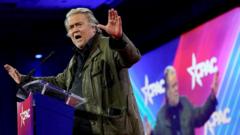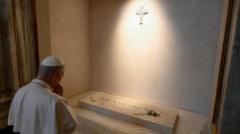As the first South American and non-European pope in over a millennium, Pope Francis’ election signaled a transformative era for the Roman Catholic Church. His humble beginnings and dedication to the underprivileged highlight the church's evolving identity amidst significant challenges.
Reflecting on Pope Francis’ Historic Election: A Landmark Moment for the Catholic Church

Reflecting on Pope Francis’ Historic Election: A Landmark Moment for the Catholic Church
The 2013 election of Jorge Mario Bergoglio, known as Pope Francis, marked a significant shift in the leadership of the Catholic Church, emphasizing a commitment to global inclusivity.
In March 2013, Jorge Mario Bergoglio made history when he was elected as the 266th pope of the Roman Catholic Church, becoming Pope Francis. His election marked a significant milestone, as he was the first South American pontiff and the first non-European pope in more than 1,200 years. Moreover, he was the first member of the Society of Jesus, or Jesuits, to ascend to the papacy.
The selection of the archbishop of Buenos Aires, who was 76 at the time, sent a clear message from the college of cardinals: the future of the Catholic Church is intricately linked to the global South, which is home to the majority of the world's Catholic population. Born to Italian immigrants and nurtured in Buenos Aires, Francis was known for his humility, advocacy for the marginalized, and a lifestyle marked by simplicity.
Upon his election, he faced numerous challenges confronting the church, including a dearth of priests, rivalry from evangelical denominations in the Southern Hemisphere, a widespread sexual abuse scandal that threatened the church's moral integrity in the West, and complexities around Vatican governance. The conclave preceding his selection was characterized by intense deliberations among cardinals regarding the pressing issues facing the church and their expectations for its next leader.
Cardinal Christoph Schönborn of Vienna emphasized the nature of the papal role, stating, “The pope’s election is something substantially different from a political election. It is not ‘the chief executive of a multinational company,’ but rather the spiritual head of a community of believers.” As Pope Francis continues his papacy, his election remains a pivotal moment in the church’s history, reflecting broader global trends and aspirations for a more inclusive religious leadership.




















